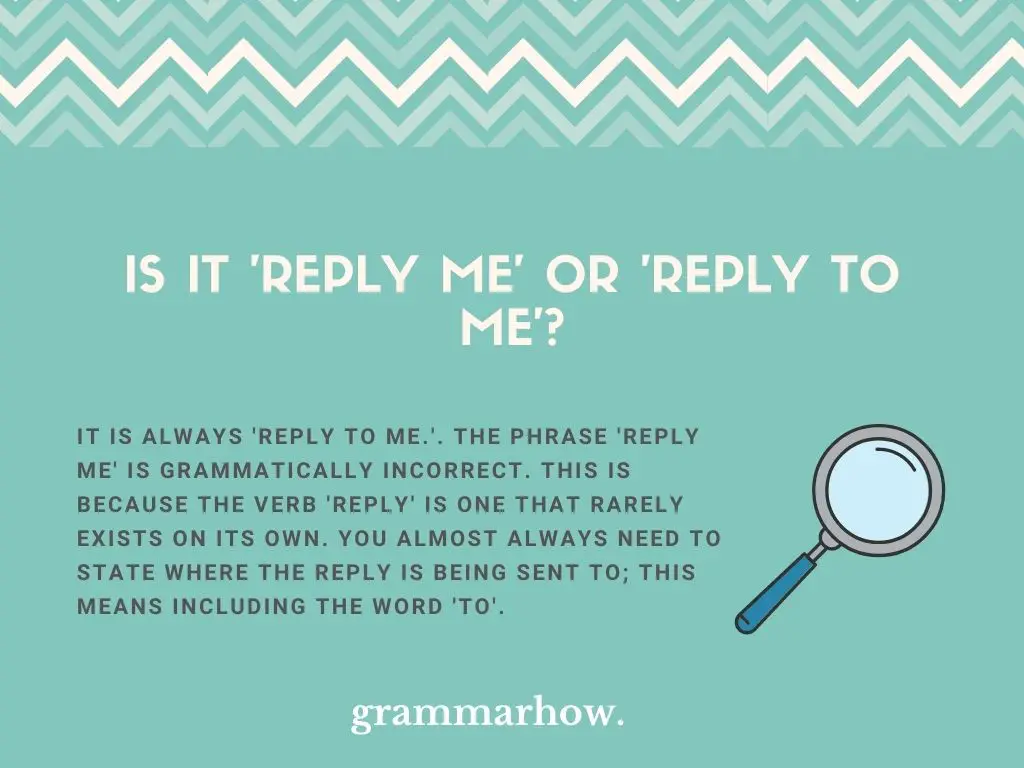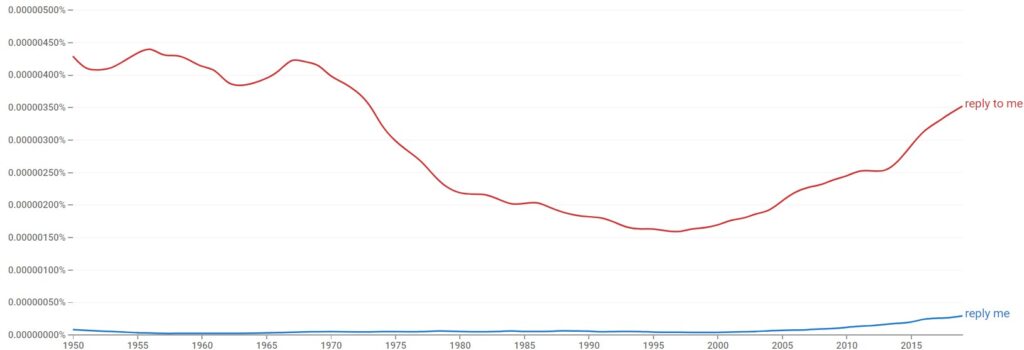In many languages, something similar to ‘reply me’ would be correct in formal emails. However, this isn’t the case with English. In fact, using the words ‘reply me’ would be completely incorrect. Let’s explain.
Is It ‘Reply Me’ or ‘Reply To Me’?
It is always ‘reply to me.’. The phrase ‘reply me’ is grammatically incorrect. This is because the verb ‘reply’ is one that rarely exists on its own. You almost always need to state where the reply is being sent to; this means including the word ‘to’.

‘Reply me’ is not grammatically correct because you need to say that the response must be sent ‘to’ somebody. By simply stating ‘me’, you aren’t saying the response should be sent to you. You are just giving the pronoun and nothing more. Of course, people can probably work it out from what you are saying, but that still doesn’t make it grammatically correct.
The phrases ‘reply me’ and ‘reply to me’ are never interchangeable. This is because ‘reply me’ is never going to be grammatically correct.
Is It Correct To Say ‘Reply Me’?
It is never grammatically correct to say ‘reply me’. In order to make the phrase ‘reply me’ work, you must add a ‘to’. This is because the word ‘reply’, in most cases, needs to state where it is going, i.e., reply to me, reply to the manager, etc.
‘In many cases, ‘reply’ is what is known as a transitive verb. This means that it needs something to complete the sentence in order for it to make sense. This means that you need to know that the reply is being sent and to who. This is why you need “reply to” and the ‘me’ part so:
- Reply: the verb
- To: where the reply is being sent
- Me: the ultimate destination for the reply.
You can only say ‘reply’ without using the word ‘to’ after if you are talking about a time you need a response. For example, both ‘reply soon’ and ‘reply tomorrow’ would be correct.
Interestingly, only recently that ‘reply me’ came into usage. If you look at Google Ngram Viewer, you will see that up until 2005, the words ‘reply me’ did not see any use. It was all about ‘reply to me’. The change is likely due to the internet/texting generation. There, it is all about shortening the number of words used. However, for now, the phrase ‘reply me’ remains grammatically incorrect.

Here are some correct and incorrect ways of using ‘reply’ in a sentence:
- Incorrect: Please reply me by the end of the day.
- Correct: Please reply to me by the end of the day.
- Incorrect: Please reply to tomorrow
- Correct: Please reply tomorrow.
- Incorrect: I reply you
- Correct: I reply to you
Reply To Me
When somebody says ‘reply to me’, it means that they are looking for any response to be sent directly to them. For example, if an email is sent out with the words “reply to me” on it, then it indicates that the sender is expecting a response to their inbox.
This phrase indicates that you want a response, and if the person sends a response to the email, it must be sent to you. It is often used in business settings to ensure that client emails are answered properly.
Ideally, if you were sending a formal email, you would make things a bit clearer than ‘reply to me’. While ‘reply to me’ is perfectly correct, formal emails often require a bit more clarity. This may mean that you add a time on to the end “by tomorrow”, or simply are a bit more polite in the sentence so “please send your reply to me”.
Here are some ways that you can use ‘reply to’ in a sentence. All of these are grammatically correct:
- Reply to me by tomorrow
- You can send your reply to the manager.
- Send your reply to our office in New York.
- You need to reply to the email by Thursday.
- Have you sent a reply to the customer yet?
What To Say Instead of ‘Reply To Me’ In Formal Emails?
There are several alternatives to ‘reply to me’ in formal emails. For example, you may want to say ‘respond to me’. You may even want to say “‘I look forward to your reply.’. Others may opt to use ‘contact me’.
While ‘reply’ is a perfectly valid verb to use, it does lack a touch of formality, although that doesn’t stop it from being used in a variety of business emails. Some people may even find that it is a little bit too forward and demanding. Because of this, you may want to look into alternatives:
- ‘Respond to me’ is something that means exactly the same as ‘reply to me’, but it seems a bit more formal.
- ‘I look forward to your reply” is much less formal, but it also puts a lot less pressure on somebody to respond.
- ‘Contact me’ can be used when you are implying somebody can contact you away from email i.e. over the phone. It is also much more formal than ‘reply’.
You may also like:
“Respond Me” vs. “Respond To Me” – Correct Version (Formal)
Response or Respond: What’s The Difference? (With Examples)

Martin holds a Master’s degree in Finance and International Business. He has six years of experience in professional communication with clients, executives, and colleagues. Furthermore, he has teaching experience from Aarhus University. Martin has been featured as an expert in communication and teaching on Forbes and Shopify. Read more about Martin here.
